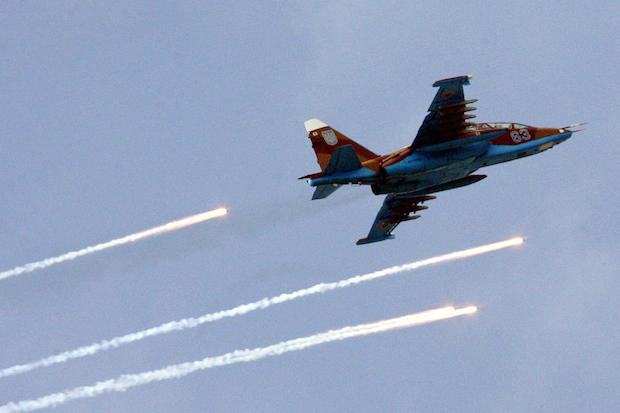Two Ukrainian SU-25 ground-attack jets have been shot down in Donetsk Oblast, about five miles away from the MH17 crash site. This double strike reinforces a chilling message: the separatist war in Ukraine continues to escalate.
Still, I’m not surprised. There’s a key reason why MH17 has failed to temper this conflict: alongside Russia, the rebels’ strength of purpose exceeds that of the West.
Since the MH17 massacre, international attention has flooded back to Ukraine. Nevertheless, the West’s response has been tepid at best. The EU and US have hedged on new sanctions and continue to rule out military support to Ukraine. Common grief has led to anger, but the anger has led to no escalation in policy. And this is a western strategic calculus from which President Putin has taken solace. Recognising his culpability in downing a civilian airliner may go unpunished, Putin has had little reason to change tack. Certainly, he’s expressed sympathy and promised to support the investigation. But for Putin, words and commitments are irrelevant. They are only mechanisms to insulate his hidden agenda. Instead, what really matters to Putin is deniability and power.
The issue of deniability is critical. Since MH17 went down, the Russian government has steadfastly denied any responsibility. Absurdly, they blame the Ukrainian government. Taking Putin at his word, you’d believe that the Donetsk rebels are independent of Russian influence. While that narrative is patently untrue, Putin is gambling that he can weather this storm of controversy via consistent denial. He is a former KGB officer defined by that career: Putin is intimately comfortable with political risk and physical brutality. Waging his covert war in Ukraine, the Russian President will deny everything as long as it serves his purpose. He knows that western intelligence services are aware he is lying, but until western leaders confront him, he’ll keep denying any involvement – because he’s learned that it works. In part, this is also a tactical calculation. If Putin had forced the rebels to de-escalate, his command authority would have become overtly apparent to western opinion. Thus, by encouraging the rebels to continue their attacks, he pretends his influence is limited.
But Putin’s calculus teaches us something broader. Until he absolutely has to – until Russia’s economy descends into a sanctions induced abyss – Putin will not yield. Because for Putin and the ‘greater-Russia’ nationalist-rebels, the war in Ukraine is not a transitory issue. Instead, it’s an existential fight for the purity of a new Russia. A Russia that is strong, feared and able to control those who surround it. Most of all, a Russia that is proud. And to win this Russia, Putin is absolutely willing to fight.
Ultimately, that strategic and emotive agenda explains why, even now, Putin is expanding support to his proxies. And why planes continue to fall from the Ukrainian sky.






Comments